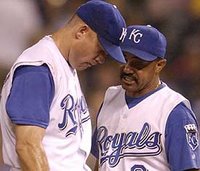 The latest development in the Jason Grimsley saga is today's news that the Arizona Diamondbacks, who unconditionally released Grimsley this week after learning that his house was raided by federal agents, do not intend to pay Grimsley the remainder of his salary for the year. It is customary for released MLB players to be paid for the remainder of a season. The Diamondbacks' move also contradicts published statements made by Grimsley's agent, Joe Bick, who said that while he expected Grimsley would retire, he thought the player would be paid this year's salary.
The latest development in the Jason Grimsley saga is today's news that the Arizona Diamondbacks, who unconditionally released Grimsley this week after learning that his house was raided by federal agents, do not intend to pay Grimsley the remainder of his salary for the year. It is customary for released MLB players to be paid for the remainder of a season. The Diamondbacks' move also contradicts published statements made by Grimsley's agent, Joe Bick, who said that while he expected Grimsley would retire, he thought the player would be paid this year's salary.
By way of published statements, the team has effectively dared Grimsley, likely to become the Linda Tripp of the steroids scandal (especially if his statements manage to drag down current MLB darling Albert Pujols), to have his union rep file a grievance. The team seems particularly miffed that after Grimsley's house was searched in April, the player declined to inform the team promptly (but instead suited up in a DBacks uniform).
Although I have no particular love for Grimsley, I suspect that the team has overstepped its bounds here. Baseball's commissioner has virtually unlimited power to act in the best interests of the game of baseball, and could conceivably, without threat of judicial / arbitral reversal, suspend Grimsley without pay. But the team itself does not have those same broad powers, unless the contract contains a clause allowing the team to escape from its obligations if the player is found to have used a controlled substance. The so called Loyalty Clause that requires a player to "obey the club's training rules" would not seem to me to be sufficient grounds to escape the contract. The Loyalty Clause (Section 3(a) of the Uniform Player Contract) provides:
The Player agrees to perform his services hereunder diligently and faithfully, to keep himself in first-class physical condition and to obey the Club's training rules, and pledges himself to the American public and to the Club to conform to high standards of personal conduct, fair play and good sportsmanship.While it may be a close issue, I don't think this clause is sufficient cover for the Diamondbacks. Is this language specific enough to be enforceable? Is Grimsley's admitted usage of HGH, anabolic steroids and amphetamines a clear violation? I think Grimsley is going to need all the money he can get (to pay for a good defense team), and pursuing that grievance is a good idea if his claim is a likely winner.
As I've suggested in some earlier posts, the steroids scandal may present many of these interesting contractual disputes. Can a team escape from its contractual obligations if a player tests positive? What if a player, like Grimsley here or Jason Giambi a year ago, hasn't failed any baseball steroids tests, but has admitted to past use? Does the fact that Grimsley is the target of law enforcement attention matter?
Update: According to agent Bick, Grimsley plans to fight the Dbacks over this matter. A grievance is "already in process," as ESPN reports here.





0 comments:
Post a Comment